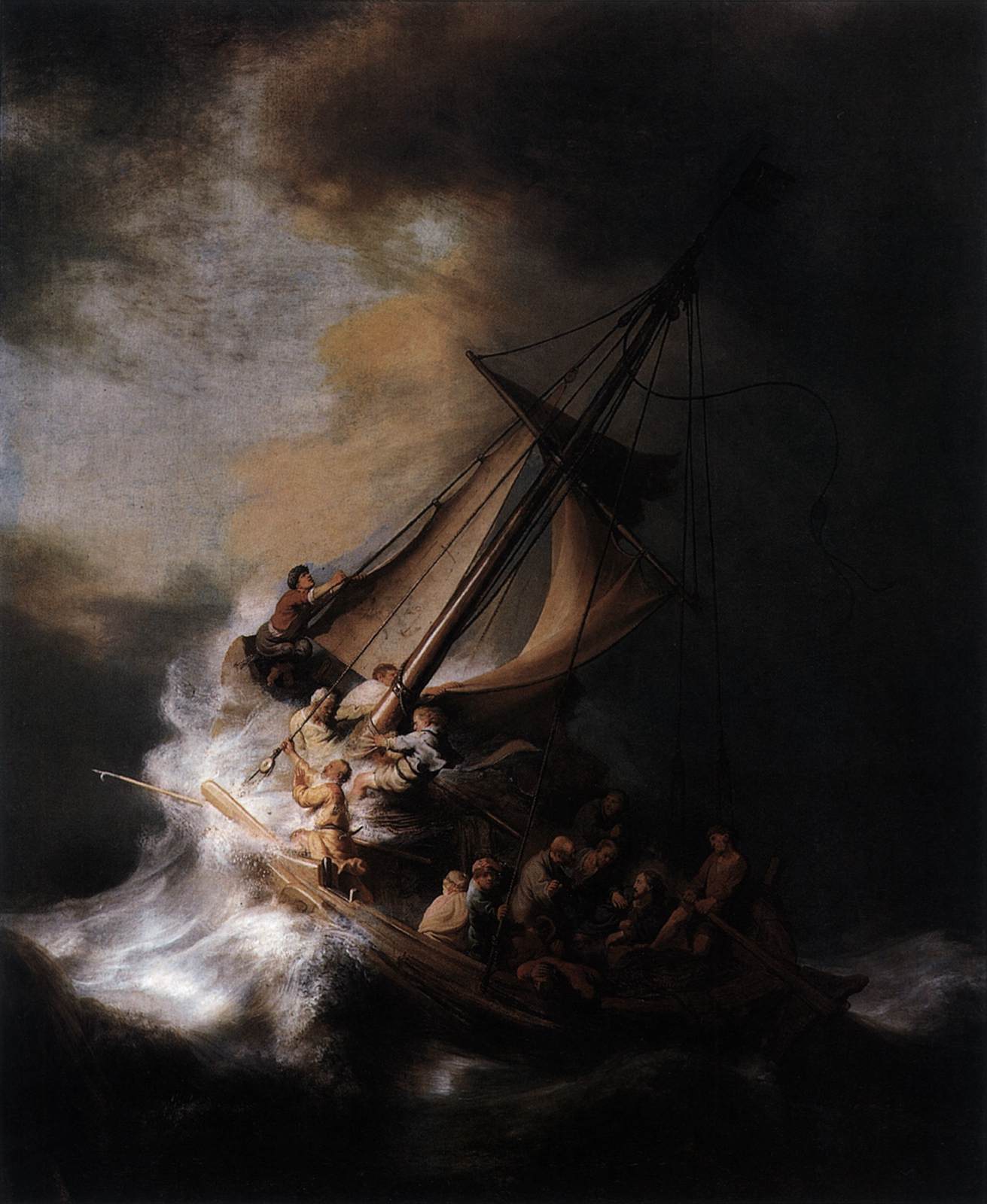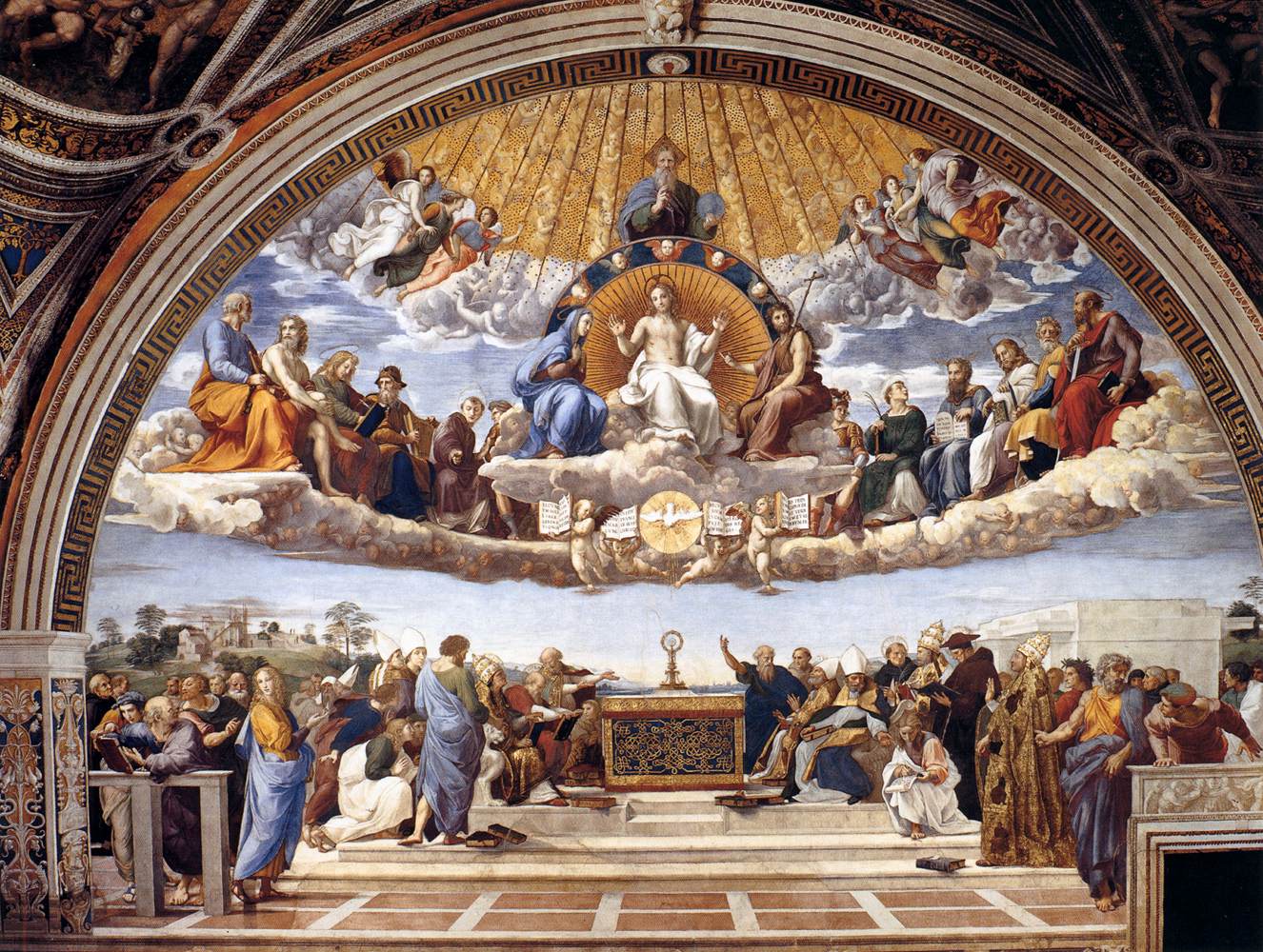‘Give her something to eat.’ Sunday Reflections, 13th Sunday in Ordinary Time, Year B

Raising of the Daughter of Jairus, Paolo Veronese, c.1546
Musée du Louvre, Paris [Web Gallery of Art]
Readings (New American Bible: Philippines, USA)
Readings(Jerusalem Bible: Australia, England & Wales, India [optional], Ireland, New Zealand, Pakistan, Scotland, South Africa)
Gospel Mark 5:21-43 (New Revised Standard Version, Catholic Edition, Canada)
When Jesus had crossed again in the boat to the other side, a great crowd gathered around him; and he was by the sea. Then one of the leaders of the synagogue named Jairus came and, when he saw him, fell at his feet and begged him repeatedly, “My little daughter is at the point of death. Come and lay your hands on her, so that she may be made well, and live.” So he went with him.
And a large crowd followed him and pressed in on him. Now there was a woman who had been suffering from hemorrhages for twelve years. She had endured much under many physicians, and had spent all that she had; and she was no better, but rather grew worse. She had heard about Jesus, and came up behind him in the crowd and touched his cloak, for she said, “If I but touch his clothes, I will be made well.” Immediately her hemorrhage stopped; and she felt in her body that she was healed of her disease. Immediately aware that power had gone forth from him, Jesus turned about in the crowd and said, “Who touched my clothes?” And his disciples said to him, “You see the crowd pressing in on you; how can you say, ‘Who touched me?’” He looked all around to see who had done it. But the woman, knowing what had happened to her, came in fear and trembling, fell down before him, and told him the whole truth. He said to her, “Daughter, your faith has made you well; go in peace, and be healed of your disease.”
While he was still speaking, some people came from the leader’s house to say, “Your daughter is dead. Why trouble the teacher any further?” But overhearing[ what they said, Jesus said to the leader of the synagogue, “Do not fear, only believe.” He allowed no one to follow him except Peter, James, and John, the brother of James. When they came to the house of the leader of the synagogue, he saw a commotion, people weeping and wailing loudly. When he had entered, he said to them, “Why do you make a commotion and weep? The child is not dead but sleeping.” And they laughed at him. Then he put them all outside, and took the child’s father and mother and those who were with him, and went in where the child was. He took her by the hand and said to her, “Talitha cum,” which means, “Little girl, get up!” And immediately the girl got up and began to walk about (she was twelve years of age). At this they were overcome with amazement. He strictly ordered them that no one should know this, and told them to give her something to eat.

Forest Landscape with Two of Christ’s Miracles
David Vinckboons, 1600-10
Metropolitan Museum of Art, New York [Web Museum of Art]
Because I will be on a pilgrimage to Malta from 24 to 30 June I am posting this early. This reflection, slightly edited, is what I posted three years ago for the same Sunday.
Lyn was someone I met when she was about 15. Three years later, when she was only halfway through her four-year college course, she quit to marry Roberto. (I’m not using their real names). Lyn was madly in love with Roberto, who had a good job and came from a relatively wealthy family. Lyn’s family could not be described as poor either. I celebrated the wedding Mass and attended the reception in a classy hotel. In the Philippines it’s the groom’s father who pays for the reception. the young couple went to live in Manila, where Roberto was from. About a year later a daughter, whom I’ll call Gloria, was born. She had a mental disability. Another daughter, ‘Gabriela’, arrived a year or two later.
Then tragedy struck. Roberto discovered that his kidneys weren’t working properly and that he needed dialysis. Over the next couple of years Roberto and Lyn spent practically all they had on this and it ended in Roberto’s death. Meanwhile, Lyn’s parents both had serious illnesses and had to spend most of their resources on treatment.
Lyn returned to her own city with her two young daughters. She couldn’t find a job and had no qualifications since she hadn’t finished in college. With much embarrassment she came to see me and asked if I could give her an ‘allowance’. She was able to survive the next few years with help from her siblings and friends and eventually remarried.
I’ve met so many ‘Lyns’ in the Philippines who are like the woman in today’s gospel, who have spent all their resources on doctors and medicine and are still sick. I’ve met families who have pawned their little bit of land in order to enable an aged parent to have surgery that ultimately leaves the whole family impoverished and the person on whom they had spent the money, out of a perhaps misplaced love, ending up in the cemetery.
Most Filipinos have little access to good health care. Even those who have government health insurance have to come up with ready cash if they go to hospital, unlike in Ireland or the United Kingdom. They are eventually reimbursed but have to pay interest on money they have borrowed in the meantime. I’ve heard people in Ireland and in the UK complain about the poor health services they have and their complaints are often justified. I have also heard many unsolicited words of praise for nurses from the Philippines working in hospitals in those countries.
Bu the sad reality is that most of these nurses, if they were still in the Philippines, would not have access to the kind of care they provide in Ireland and the UK. They would be like the woman in the gospel.
I met a Filipina in Reykjavík in 2000 who told me that she had had a kidney transplant in Denmark, paid for by the taxpayers of Iceland, a country of only 300,000 people or so. Had she been at home she would probably have ended up like Roberto.
Twenty-two years ago in a parish in Mindanao I buried Eileen, like the daughter of Jairus, a 12-year-old. Again, poverty was a significant factor in her illness and death, despite the efforts of the doctors and nurses in the small government hospital where she died.
So the two stories interwoven by St Mark are stories that many Filipinos have lived or are living.
But sometimes persons experience healing. I once gave a recollection day to a group of 11- and 12-year old children in a Catholic school in Cebu City. We reflected on the story of Jesus staying behind in the Temple when he was 12 and that of the daughter of Jairus, also 12. Before the afternoon session a group of the boys and girls came to tell me that Maria, one of their classmates, had a bad toothache and asked if we could pray with her. Maybe Jesus would heal her as he had healed ‘Talitha’. They thought that that was the name of the girl in the gospel! We prayed with Maria – and her toothache disappeared. The children were delighted.
St Mark gives us illustrations of the humanity of Jesus more than do St Matthew and St Luke when they recount the same stories. Scholars tell us that St Mark’s was the first gospel to be written and that the other two drew on his in writing theirs. St Matthew omits the detail of Jesus perceiving in himself that power had gone forth from him. This shows us that Jesus wasn’t a ‘magician’. When he healed a sick person he gave of himself.
St Matthew leaves out another beautiful detail about the humanity of our Saviour. Jesus says to the people in the house, Give her something to eat. I can imagine the joy of everyone, including Jesus. I picture him with a smile on his face, a smile that reflects his joy – and his awareness that the girl’s family had forgotten the very practical detail that she was starving, as is anyone who has come through a serious illness. This detail of St Mark brings home to me the great reality that St John expressed in his gospel and that we pray in the Angelus, The Word became flesh and lived among us (John 1:14).











.jpg/640px-Cedars02(js).jpg)











